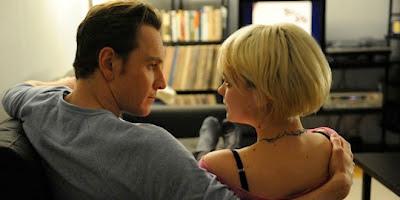DEPTH: 5
ACTING: 5
PLOT: 5
ORIGINALITY: 5
ENTERTAINMENT: 3
PRODUCTION: 4
DEMAND ON VIEWER: High
OVERALL: Selective Recommendation (see only if specifically interested in the themes)

But as the story unfolds, we find that there are worse things: a codependent sister whose vague boundaries with sex seem to destroy Brandon's ability to desire sex with any woman for whom he might care about. He does not want more of what he already has—a sexually overtoned, exhuasting, ethically challenging, and overtly demanding relationship with his sister.
He is emotionally "married" to her (Carey Mulligan). They have eerily accurate marital spats ("You're being dramatic." "No, I'm not, I'm trying to talk to you.") as well as sexual tension played out physically and emotionally (they can pull each others' strings like no one else can). But their intimacy only makes him angry, suggesting a deep childhood neurosis. The film suggests that he has spent his life running from her.
The metaphor of running is brought out in several scenes as he runs to burn off his anger, impotence, and enormously powerful sexual energy. He is ashamed of his sister, of his own repressed enmeshment with her, and fundamentally it is this shame which sets him on the track of other sorts of shame.
The shame and guilt we associate to sex is really a shame and guilt directed at ourselves, at what we have no choice about. The abyss of this self-guilt opens up in Fassbender's face chiefly while he is in the act of sex. The very thing that helps him escape from himself also brings him into direct contact with his denied emotion of sadness, emptiness, longing. He wants to love, but is ashamed at what he seems destined to love.
Lest we think, however, that this is some morality play (and here is where the film is truly brilliant), Brandon's poetic sensuality with women is brought out as a fundamentally good thing and breathtakingly beautiful. Much time is spent on Brandon's careful observation, his joy in the mere presence of women, while other men fawn and paw and act brutishly. Women are drawn to Brandon's quite poise, his mysteriousness, and his natural sexuality. Even when he is at what society would deem his "worst," engaging in threesomes or feeling up someone else's girlfriend, the film captures an existential density and artistic significance to those moments.
 By contrast his boss, a more conventional womanizer, cannot remember the color of a woman's eyes when she closes them. His boss really does use women in the crassest sense, yet in nearly the same breath he can declare Brandon's pornography use "sick." His character illustrates the double standards we have about sex. We tend to treat an extramarital affair as something fundamentally evil. And yet, simultaneously it is standard, to be expected, almost boilerplate. We condemn and repress our sexuality so much that we guarantee that such things go on. Instead of acknowledging ourselves, we hide from our true selves and therefore face self-torment. Is this self-denial perhaps is our true shame?
By contrast his boss, a more conventional womanizer, cannot remember the color of a woman's eyes when she closes them. His boss really does use women in the crassest sense, yet in nearly the same breath he can declare Brandon's pornography use "sick." His character illustrates the double standards we have about sex. We tend to treat an extramarital affair as something fundamentally evil. And yet, simultaneously it is standard, to be expected, almost boilerplate. We condemn and repress our sexuality so much that we guarantee that such things go on. Instead of acknowledging ourselves, we hide from our true selves and therefore face self-torment. Is this self-denial perhaps is our true shame?A criticism: The film highlights the dangers of sex, but not enough of its joy and healing. One wishes that Fassbender could have shown a transfigured ecstasy rather than a pained, skull-and-crossbones look when in the throes of his deepest passions. Still, sex is a dangerous thing, because it resides in the subconscious world (ironically Fassbender stars in another role on this topic, playing Carl Jung in A Dangerous Method.) When, out of fear, people begin to attack, slander, demonize, isolate, and marginalize that subconscious world, what do they really accomplish except their own and others' repression and neurosis?
Do we have a choice about our own sexuality? This is not an easy question. After a sequence of rather harrowing events, a woman with a ring on her finger clearly invites him to follow her. What will he do? The judgment is now left to the viewer. How will we judge him? The answer is a clue to how we judge ourselves. Perhaps the reason this film is difficult is that it uncovers our own deepest sources of shame.







No comments:
Post a Comment